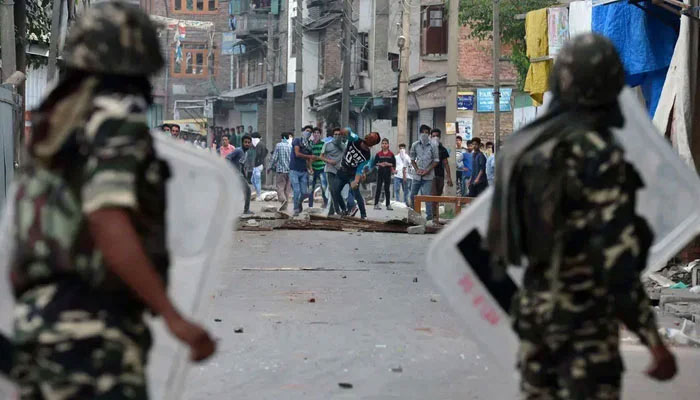Kashmir struggle
Plight of Kashmiris is tragic reminder of international community’s failure to enforce its own resolutions
On January 5, 1949, the United Nations adopted a resolution that promised the people of Indian Illegally Occupied Jammu and Kashmir (IIOJK) the right to determine their own future through a free and impartial plebiscite. Seventy-six years later, that promise remains unfulfilled, leaving the Kashmiris to endure an unrelenting cycle of violence, occupation, and systemic oppression. As Pakistan observed the Occupied Kashmir’s Right to Self-Determination Day on Sunday, the country’s leadership, including President Asif Ali Zardari and Prime Minister Shehbaz Sharif, reaffirmed their unwavering support for the Kashmiri people’s struggle for freedom. The plight of the Kashmiris is a tragic reminder of the international community’s failure to enforce its own resolutions. India’s unilateral revocation of Jammu and Kashmir’s special status on August 5, 2019, compounded decades of injustice. By stripping the region of its autonomy and initiating demographic changes, India has sought to suppress the Kashmiri identity. Despite these measures, the resilience and spirit of the Kashmiri people remain unbroken.
The Kashmir dispute is not merely a bilateral issue between Pakistan and India; it is a question of fundamental human rights and international law. Yet, the global response to the suffering of the Kashmiri people has been disturbingly muted. Except for Pakistan, which continues to raise the issue on international platforms, there has been a marked decline in global support for the Kashmiri cause. The international community’s apathy emboldens India to continue its oppressive policies, including widespread human rights abuses, mass detentions, curfews, and the use of pellet guns that have blinded children. Pakistan, while grappling with its own economic challenges and complex regional dynamics, cannot abandon its moral and diplomatic responsibility towards Occupied Kashmir. However, resolving this seven-decade-long conflict requires more than Pakistan’s solitary efforts. Global powers and regional stakeholders need to recognise that peace in South Asia hinges on resolving the Kashmir dispute.
India, on the other hand, appears unwavering in its stance. Its actions in Occupied Kashmir are not only a violation of international law but also an affront to human dignity. The comparison of Kashmir with other global struggles is apt. They represent the consequences of colonial legacies and the failure of international systems meant to safeguard human rights. Beyond rhetoric, Islamabad must explore innovative ways to garner international support and spotlight India’s transgressions. The Kashmiri people deserve the right to determine their own destiny – a right enshrined in the UN Charter and reaffirmed through resolutions and international law. It is incumbent upon all nations that value freedom and justice to support their cause. The struggle for self-determination is not just Kashmir’s fight; it is a universal battle against oppression and a call to uphold the dignity and rights of every individual. As Pakistan’s leadership reiterated on January 5, the time has come for the world to act. The Kashmiri people have waited long enough for the justice they were promised. The world must not allow another year to pass with unfulfilled commitments and unheeded cries for freedom. Kashmir’s struggle for self-determination must not remain a forgotten promise – it must become a global imperative.
-
 King Offers Harry, Meghan Markle A 30 Bedroom Lodge Despite Its Decades Of Baggage: ‘it’s An Olive Branch’
King Offers Harry, Meghan Markle A 30 Bedroom Lodge Despite Its Decades Of Baggage: ‘it’s An Olive Branch’ -
 Selma Blair Talks About How Her Debilitating Disease Is 'misunderstood'
Selma Blair Talks About How Her Debilitating Disease Is 'misunderstood' -
 China’s 5-year Tech Strategy: What To Expect At Annual Parliament Meeting Amid Rivalry With West
China’s 5-year Tech Strategy: What To Expect At Annual Parliament Meeting Amid Rivalry With West -
 Andrew’s Total Meltdown On The Day Of Eviction: Insider Breaks It Down Word For Word
Andrew’s Total Meltdown On The Day Of Eviction: Insider Breaks It Down Word For Word -
 Michael J. Fox Stuns Actor Awards Audience With Rare Confession Amid Parkinson's Disease
Michael J. Fox Stuns Actor Awards Audience With Rare Confession Amid Parkinson's Disease -
 Beatrice’s In-laws Stand Against Her Marriage: ‘Furious Their Son Is Wrapped Up In Wreckage’
Beatrice’s In-laws Stand Against Her Marriage: ‘Furious Their Son Is Wrapped Up In Wreckage’ -
 Jessie Buckley Utters 'wild' Remarks For 'Hamnet' Co-star Emily Watson At Actor Awards
Jessie Buckley Utters 'wild' Remarks For 'Hamnet' Co-star Emily Watson At Actor Awards -
 Who Could Replace Ayatollah Ali Khamenei? Iran’s Top Successor Candidates Explained
Who Could Replace Ayatollah Ali Khamenei? Iran’s Top Successor Candidates Explained -
 Oliver 'Power' Grant Cause Of Death Revealed
Oliver 'Power' Grant Cause Of Death Revealed -
 Michael B. Jordan Makes Bombshell Confession At Actor Awards After BAFTA Controversy: 'Unbelievable'
Michael B. Jordan Makes Bombshell Confession At Actor Awards After BAFTA Controversy: 'Unbelievable' -
 Prince William Willing To Walk Road He ‘loathes’ For ‘horror Show’ Escape: ‘He’s Running Out Of Allies Fast’
Prince William Willing To Walk Road He ‘loathes’ For ‘horror Show’ Escape: ‘He’s Running Out Of Allies Fast’ -
 Pentagon Says No Evidence Iran Planned Attack On US, Undercutting Strike Justification
Pentagon Says No Evidence Iran Planned Attack On US, Undercutting Strike Justification -
 Prince William’s Changes Priorities With Harry After Kate Middleton’s Remission: ‘It Couldn't Be Worse’
Prince William’s Changes Priorities With Harry After Kate Middleton’s Remission: ‘It Couldn't Be Worse’ -
 Justin Bieber Gets Touching Tribute From Mom Pattie Mallette On Turning 32 Amid Limited-edition Birthday Drop
Justin Bieber Gets Touching Tribute From Mom Pattie Mallette On Turning 32 Amid Limited-edition Birthday Drop -
 Jada Pinkett Smith Details How Her Memoir Combats 'shame' Around Alopecia
Jada Pinkett Smith Details How Her Memoir Combats 'shame' Around Alopecia -
 Harrison Ford Reflects On Career As He Receives Life Achievement Award At 2026 Actor Awards
Harrison Ford Reflects On Career As He Receives Life Achievement Award At 2026 Actor Awards




